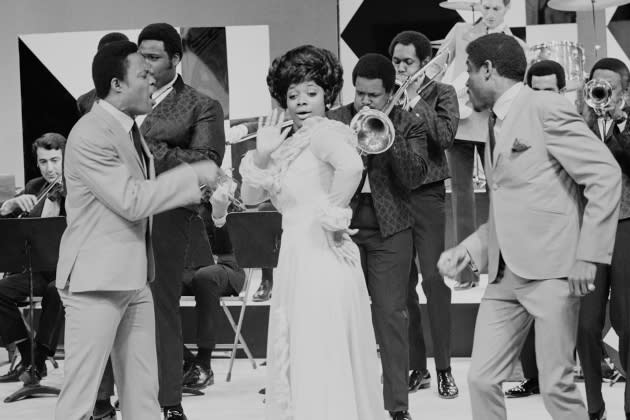New Stax Collection Will Make You Rethink One of American Music’s Most Important Record Labels
- Oops!Something went wrong.Please try again later.
- Oops!Something went wrong.Please try again later.
- Oops!Something went wrong.Please try again later.

The story of Stax records has long been smoothed over and sculpted into a neat bundle of Southern aphorism and marketing copy: The Memphis home of “Soul Man” and Shaft and the Staple Singers was the more authentic (insert adjective like “gritty” or “greasy” or “Southern-fried” here), counterpart to the pop-oriented Motown; a rare space of multiracial utopia in a segregated Sixties South; a locus, for Blacks in Memphis at the time, for the expressions and dreams of a better American future that lost its way in 1968 when those dreams vanished with the assassination of MLK. Or so the story goes.
There’s a much more profound story being told about the label in Written In Their Soul: The Stax Songwriter Demos, a revelatory new 146-song set of previously unreleased demos from a crop of its many unheralded songwriters. That story is of a record label providing an ongoing space, creative ecosystem and infrastructure for some of the most profound popular American songwriting of the 20th century, much of which, as this collection demonstrates, the listening public has never even heard.
More from Rolling Stone
Militarie Gun's Raucous Debut Is an Emotional Breakdown Dressed Up Like a Sugar Rush
Geese Get Bluesier, Proggier, Dancier, Slicker, Rougher, Weirder, Better on '3D Country'
With His World Turned Upside Down, Gunna Turns It Up on 'A Gift & A Curse'
Hearing rough takes on established classics like the Staples Singers’ “Respect Yourself” and Wilson Pickett’s “634-5789 (Soulsville, U.S.A.)” brings plenty of fresh insights. It comes as some surprise that Bettye Crutcher’s raw take of her “There Is A God,” for example, may have even more jump in its step than the 1974 Staple classic.
But it is the never before heard originals that makes Written In Their Soul an essential piece of music history. Some of them show a label influenced by and responsive to the pop marketplace (“Grandpa’s Will,” by Homer Banks, was copyrighted within a year of the release of the similar-sounding “Grandma’s Hands” by Bill Withers). Some of them are playfully in conversation with the label’s own history (hear William Bell quote Otis Redding’s “I’ve Been Loving You Too Long” in his slow burning beauty “It’s No Secret”). Many of them, like Mack Rice’s “Three Meals A Day,” hint at the commitment to social commentary (in this case, anti-war protest) that persisted throughout the label’s history. Many of them feel predictive of several sonic trends and micro-genres to come in the next several decades (Quiet Storm, disco, piano soft-rock, to name a few). All of them deepen, broaden, and complicate our understanding not only of Stax but of Southern soul and Sixties/Seventies popular music.

At its best, Written in Their Soul offers a barrage of tantalizing alternative futures and pop music ‘what if’s’: How might the late Sixties have sounded if songwriters like Bettye Crutcher had had an easier time getting her songs cut at the male-dominated label? Her demo of the simmering “Everybody is Talking Love” offers an answer. What if “Walk On Back,” a gorgeous doo-wop-meets-country-gospel ballad demo so obscure no one was even able to identify the artist singing, had become the standard it feels like it already is upon first listen? What if Homer Banks’ “I’ve Got a Feeling (We’ll Be Seeing Each Other Again)” had become the smooth Top 40 staple it sounds like it could have been? What if Wendy Rene, whose demo of “Break Out (AKA Bust Out)” is a thrilling Jackson Five sugar-rush, had become a superstar?
The result of painstaking archival masterwork from Cheryl Pawelski, who combed through nearly two thousands hours of unlabeled tapes to compile this box set, Written In Their Soul places songwriters like Crutcher, Banks, Rice, and Deanie Parker–less heralded than Stax icons like Booker T. Jones, David Porter and Isaac Hayes–at the forefront of the label’s decade-plus of music-making. Deep cuts from slightly more well known names like Eddie Floyd and William Bell cement both singer-songwriters as genius craftsmen who evidently wrote more perfect pop gems (see Floyd’s “How Can I Win Your Love” and Bell’s “Thank You For Loving Me”) that the label could even keep up with. Artists not known as songwriters, and vice versa, shine in their lesser-known roles: the piano-ballad “It’s Up To You” and the guitar-jangle of “Let’s Be Sure,” both written by Carla Thomas, make a convincing argument that one of the label’s first stars was every bit a master of pop melodicism as a songwriter. Taken in whole, Written In Their Soul is a stunning surplus of long-buried treasures that radically reshapes our understanding of a foundational American record label and its legacy, nearly sixty some odd years later.
Best of Rolling Stone

